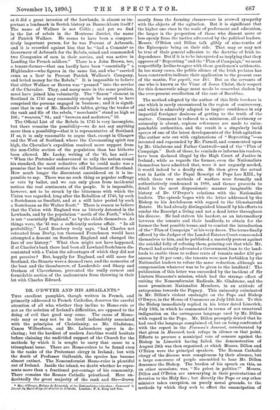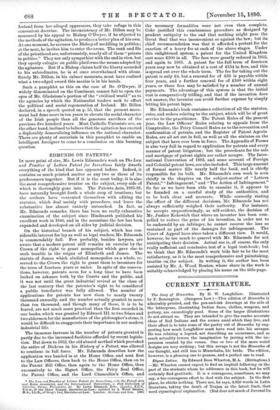DR. O'DWYER AND HIS ASSAILANTS.*
Tins excellent pamphlet, though written in French, and primarily addressed to French Catholics, deserves the careful attention of all who, whether they incline to Home-rule or not as the solution of Ireland's difficulties, are opposed to the doing of evil that good may come. The cause of Home- rule may or may not be in itself indissolubly associated with the principles of Christianity, as Mr. Gladstone, Canon Wilberforce, and Mr. Labouchere agree in de- claring ; but the hardiest of modern Jacobins would hesitate before claiming the undivided support of the Church for the methods by which it is sought to carry that cause to a triumphant issue. There are Home-rulers to be found even in the ranks of the Protestant clergy in Ireland ; but with the death of Professor Galbraith, the species has become almost extinct. The Nonconformist Home-ruler is plentiful out of Ireland. Inside the island, we doubt whether he repre- sents more than a fractional per-tentage of his community. There remains the Roman Catholic priesthood. Here un- doubtedly the great majority of the rank and file—drawn • Mgr. O'Dwyer, Reigns de Limerick, et les lationaltistec irlandais : Comment le Decree du Saint-Silge est observe en Mande. London: P. 13. King and Son.
mostly from the farming classes—are in avowed sympathy with the objects of the agitation. But it is significant that the higher one rises in the scale of preferment and education, the larger is the proportion of those who dissent more or less openly from the tactics advocated by the political leaders. Messrs.' O'Brien and Dillon talk glibly of nine-tenths of the Episcopate being on their side. That may or may not be true of their general adhesion to the doctrine of Irish in- dependence. But if it is to be interpreted as implying that they approve of " Boycotting " and the "Plan of Campaign," we must respectfully decline to agree with these gentlemen's arithmetic. In too many cases, the politic silence of the Irish prelates has been construed to indicate their application to the present case of the maxim, Vox populi, vox Dei. But as the servants of one who is known as the Vicar of Jesus Christ, their respect for this democratic adage must needs be somewhat shaken by the ever-present recollection of the case of Bara.bbae.
The method adopted by the author of this little brochure is one which is rarely encountered in the region of controversy, and which is admirably adapted to inspire confidence in any impartial foreigner desirous of getting to the truth of the matter. Comment is reduced to a minimum, all acrimony or animosity is absent, copious references are made to unim- peachable authorities, and the result is a singularly lucid apercu of one of the latest developments of the Irish agitation- The author sets out with explanations of " Boycotting "—as invented and expounded by Mr. Parnell, and commented upon by Mr. Gladstone and Father Cantwell—and of the " Plan of Campaign." Both of these, he reminds or informs his readers, have been declared illegal by the High Court of Justice in Ireland ; while as regards the former, even the Nationalists themselves have admitted that, were it not urgently needed, it would indeed be a deadly sin. He then gives the actual_ text in Latin of the Papal Rescript of Pope Leo %III., by which these two methods of warfare were formally and authoritatively condemned in 1888, and thence proceeds to detail in the most dispassionate manner imaginable the history of Dr. O'Dwyer's relations with the Nationalist leaders. The episode began with the letter addressed by the Bishop to his Archdeacon with regard to the Glensharrold Estate. He had already distinguished himself by his efforts to render the Rescript a living and not a dead letter throughout his diocese. He had striven his hardest, as an intermediary between the tenants and their landlords, to obtain for the former the best possible terms, and to combat the introduction of the " Plan of Campaign " at his very doors. The terms finally offered by the Judges of the Landed Estates Court commended themselves to him, and he published a masterly protest against the suicidal folly of refusing them, pointing out that while Mr. Parnell had actually advocated a Government loan to the land- lords to enable them to reduce rents of tenants under £50 per annum by 30 per cent., the tenants were now forbidden by the Nationalist leaders to refuse the same reduction, although no compensation whatever was to be given to the landlord ! The publication of this letter was succeeded by the incident of Sir Lintorn Simmons's mission, which had the strange effect of uniting the Nonconformist Radicals, Mr. Gladstone, and the most prominent Nationalist Members, in an attitude of antagonism towards the Papacy. This animosity culminated in Mr. Dillon's violent onslaught on the Pope and Bishop O'Dwyer, in the House of Commons on July 11th last. To this the Bishop immediately replied in his letter dated Limerick, July 13th, in which he commented in terms of not unnatural indignation on the outrageous language used by Mr. Dillon with regard to the Pope. Mr. Dillon promptly denied that he had used the language complained of, but on being confronted with the report in the Freeman's Journal, corroborated by that given in Hansard, took refuge in silence on that point. Efforts to procure a municipal vote of censure against the Bishop in Limerick having failed, the demonstration of August 24th was then organised, at which Messrs. Dillon and O'Brien were the principal speakers. The Roman Catholic clergy of the diocese were conspicuous by their absence, but a large concourse of people assembled to hear Mr. Dillon denounce the Bishop. The burden of his speech on this, as on other occasions, was, " No priest in politics !" Messrs. Dillon and O'Brien are unwearying in their protestations of devotion to the Holy See ; but directly the Pope or any other minister takes exception, on purely moral grounds, to the methods by which they seek to effect the emancipation of
Ireland from her alleged oppressors, they take refuge in this convenient doctrine. The inconsistency of Mr. Dillon may be measured by his appeal to Bishop O'Dwyer, if he objected to the methods of the agitation, to produce a better plan of his own. At one moment, he accuses the Bishop of meddling in politics ; at the next, he invites him to enter the arena. The rank and file of the priesthood are, unfortunately, nearly all of them " priests in politics." They not only sympathise with the end in view, but they openly eulogise on public platforms the means adopted by the agitators. But if a Bishop claims half the liberty accorded to his subordinates, he is at once overwhelmed with abuse. Surely Mr. Dillon, in his calmer moments, must have realised what a two-edged sword this maxim is in his hands.
Such a pamphlet as this on the case of Dr. O'Dwyer, if widely disseminated on the Continent, cannot fail to open the eyes of Mr. Gladstone's portion of the " civilised world " as to the agencies by which the Nationalist leaders seek to effect the political and social regeneration of Ireland. Mr. Dillon declared, in a speech quoted on p. 55, that the present move- ment had done more in ten years to elevate the social character of the Irish people than all the generous sacrifices of the previous five hundred years. Most Catholic Unionists are, on the other hand, inclined to believe that the agitation has exerted a deplorably demoralising influence on the national character. There are plenty of materials in this pamphlet to enable an intelligent foreigner to come to a conclusion on this burning question.



















































 Previous page
Previous page